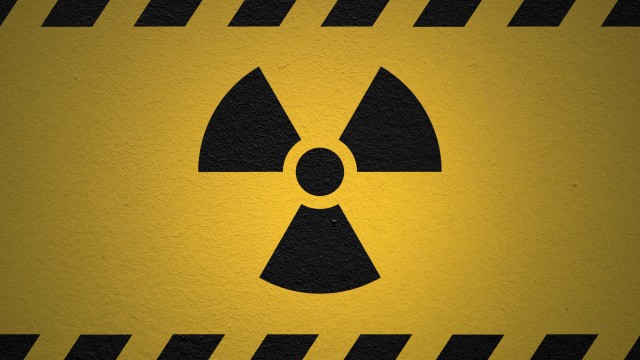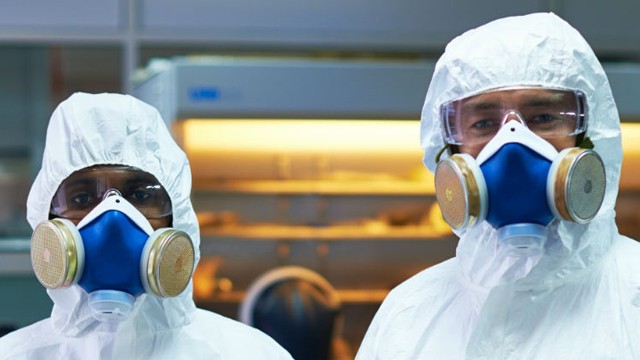Nuclear applications
Woking closely with industry, we apply and develop computational and experimental methods to detect radioactive and nuclear material across security, energy and medical applications. Our research draws on the latest artificial intelligence approaches including neural networks and genetic algorithms.
Past projects
- Machine learning techniques for nuclear decommissioning in collaboration with the University of Surrey Chemistry Department, National Nuclear Laboratory and part of the TRANSCEND consortium, 2019-2023
- Optimised scintillator section through fuzzy logic in collaboration with the Nuclear Science Security Network, 2021
- Quantum dot enhanced detection technology, 2017-2021
- Innovative alpha detection for environmental applications, 2018-2019
- Thermoluminescence of fibres and beads for radiation dosimetry, 2018-2022
Team members

Dr Caroline Shenton-Taylor
Nuclear Applications and AI Lead, Senior Lecturer
Biography
Caroline is a Applied Nuclear Physics Senior Lecturer and leads the Nuclear Applications and AI Surrey Group, addressing challenges within nuclear security, nuclear decommissioning, nuclear forensics, nuclear medicine and health monitoring.
Alongside her research and teaching, Caroline is passionate about scientific exchange and runs the YouTube channel Dr CST She was the season 2 and 3 co-host of the Surrey Speaks Podcast, and has contributed to Radio 4, local radio and numerous festival and outreach events. Explore more of Caroline's outreach work on her Dr CST website.
Caroline obtained her PhD in the field of Magnetic Compton Scattering in 2007 from the University of Warwick. Working with synchrotron X-rays, she explored a range of magnetic materials with applications including enhanced computer memory and innovative refrigeration. From 2007 to 2017 Caroline transitioned into industry, leading a diverse portfolio of scientific research projects on behalf of the UK Ministry of Defence and UK Home Office. Throughout this time Caroline was the Team and Technical Lead for an interdisciplinary research team, focused on the development of novel methods to detect the presence of radiological and nuclear materials. in 2017 she joined the University of Surrey forming the Nuclear Applications and AI team.
Current researchers





Affiliated to group



Selected publications and proceedings
- Developing feed‑forward neural networks to perform identification on a wide variety of radionuclides in gamma spectra (2025) J Wroe-Brown, C. Shenton-Taylor
- Assessing the generalisation of artificial intelligence across mammography manufacturers (2025) A J Hickman, S Gomes, L M Warren, N A S Smith, C Shenton-Taylor
- Validation of simulated training sets using a convolutional neural network for isotope identification in urban environments (2025) L Lee-Brewin, R Holden, C Shenton-Taylor
- Creation of simulated mammography data to supplement machine learning training datasets (2024) A. Worthy, A. Mackenzie, N. Smith, and C. Shenton-Taylor SPIE IWBI 2024
- An artificial neural network algorithm developed for shielded multi-isotope identification (2023) L Lee-Brewin, D. Read and C. Shenton-Taylor
- Thermoluminescence Glow Curve Study of beta irradiated Ge doped core fibre with different dopant concentrations, (2022) C. Termsuk, S. Sweeney and C. Shenton-Taylor, Radiation Physics and Chemistry
- Fading and Residual Responses for Thermoluminescent Dosimetry of Silica Beads Irradiated Using a High-dose Electron-beam (2021) K Ley, S A Hashim, A Lohstroh, C Shenton-Taylor, D A Bradley, Radiation Physics and Chemistry
- X-ray Luminescence of Nanocomposite Plastic Scintillator using CuInS/ZnS Quantum Dots (2021) C.L. Grove, I.H.B. Braddock, M.P. Taggart, C. Crean, S.J. Sweeney, P.J. Sellin, and C. Shenton-Taylor SORMA West
- Thermoluminescence response of silica beads to high-dose irradiations (2020) K Ley, S A Hashim, A Lohstroh, C Shenton-Taylor, D A Bradley, Radiation Physics and Chemistry
- Application of a novel search method to handled gamma radiation detection (2019) P K Soin, S Pitts, C Shenton-Taylor, J Barnes, IEEE Sensors Journal
- Investigating the components of signals produced by the Pockels CCD imaging technique in CdZnTe (2019) S Parsons, A Langley, C Shenton-Taylor, A Lohstroh, IEEE Transactions on Nuclear Science
PhD thesis
- Machine Learning Techniques Applied to Challenging Gamma Spectra - Dr L Lee-Brewin
- Silica based fibres for radiation dosimetry - Dr C Termsuk
- Quantum Dot Loaded Nanocomposite Plastic Scintillators - Dr C Grove
- Thermoluminescence of silica beads for dosimetry up to 250 kGy - Dr K Ley
- Detecting ionizing radiation with polarising light - Dr S. Parsons
Conferences and events
Interested in our research? These are some recent places we have presented at...
Areas of research interest include
- Convolutional neutral networks applied to Nuclear Security
- Machine leaning within Nuclear Health
- Physics informed machine learning for the Nuclear Industry
- AI deep learning methods applied to Nuclear Applications
- Genetic algorithms, sparse data techniques, fuzzy logic
Browse the University's frequently updated list of self-funded and funded studentships open for applications.
Areas of research interest include
- Convolutional neutral networks applied to Nuclear Security
- Machine leaning within Nuclear Health
- Physics informed machine learning for the Nuclear Industry
- AI deep learning methods applied to Nuclear Applications
- Genetic algorithms, sparse data techniques, fuzzy logic
Browse the University's frequently updated list of self-funded and funded studentships open for applications.






